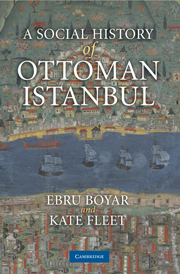Book contents
- Frontmatter
- Contents
- List of illustrations
- List of maps
- Acknowledgements
- Chronology
- Who's who
- Map 1 Istanbul and its environs
- Map 2 Locations within the city
- Introduction
- 1 Conquest
- 2 The palace and the populace
- 3 Fear and death
- 4 Welfare
- 5 The consuming city
- 6 Outings and excursions
- 7 The hamam
- 8 The nineteenth century
- Beyond the city
- Select bibliography
- Index
3 - Fear and death
Published online by Cambridge University Press: 05 June 2012
- Frontmatter
- Contents
- List of illustrations
- List of maps
- Acknowledgements
- Chronology
- Who's who
- Map 1 Istanbul and its environs
- Map 2 Locations within the city
- Introduction
- 1 Conquest
- 2 The palace and the populace
- 3 Fear and death
- 4 Welfare
- 5 The consuming city
- 6 Outings and excursions
- 7 The hamam
- 8 The nineteenth century
- Beyond the city
- Select bibliography
- Index
Summary
Istanbul was a violent city where life was precarious and death lurked just around the corner. Danger could strike at any moment in the form of mob violence, seditious revolt, riot, street violence or straightforward crime. The state could inflict sudden and fatal punishment, or the city could fall victim to earthquakes or floods. Plague was rampant and pernicious fires broke out constantly, rolling at horrifying speed through the city, consuming everything in their wake, caught in a sea of flame and reduced to smouldering ashes.
In a city where fear and death were normal attributes of everyday life, people coped by praying and by turning to magic. They resorted to doctors and medicines, and purchased amulets to protect themselves from evil. They pulled down the shutters of their shops and hid away in their houses. They resorted to bribes. They did not, however, succumb to the supine fatalism that western observers were so fond of ascribing to them, or the ‘vehement fatalism’ the Austrian-turned-Ottoman ambassador Franz von Werner (Murad Efendi) attributed to the Istanbul ‘proletariat’ in the 1870s which allowed them to find satisfaction with their situation.
The violence of nature
Part of what made the city dangerous was its geographical position in the centre of an active earthquake zone. Earthquakes struck often and were frequently devastating, such as that in 1658/59.
- Type
- Chapter
- Information
- A Social History of Ottoman Istanbul , pp. 72 - 128Publisher: Cambridge University PressPrint publication year: 2010



